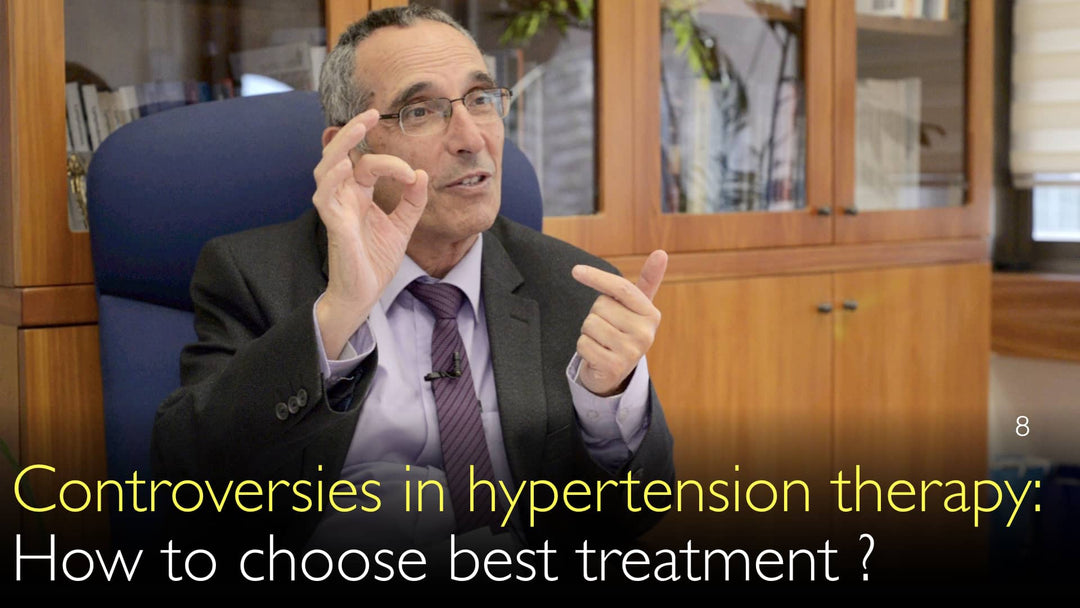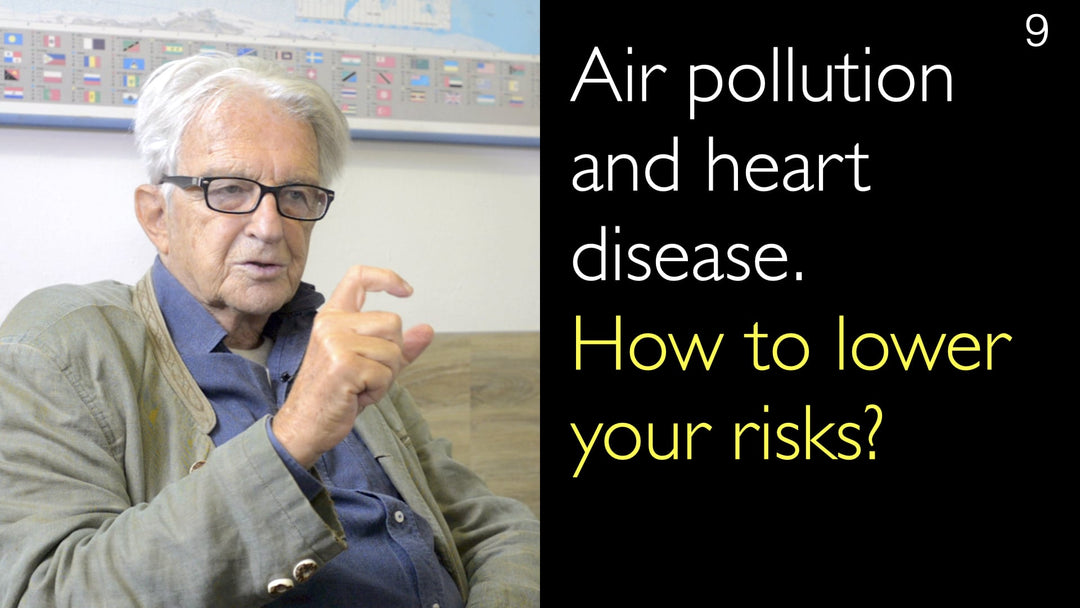Leading expert in hypertension therapy, Dr. Ehud Grossman, MD, explains key controversies in high blood pressure treatment. He details optimal blood pressure targets and first-line medication choices. Dr. Ehud Grossman, MD, discusses the shift from older beta-blockers to modern ACE inhibitor and calcium channel blocker combinations. He highlights the role of specific diuretics like indapamide for achieving treatment goals. The interview covers strategies for managing hypertension in elderly patients.
Modern Hypertension Treatment Strategies and Medication Choices
Jump To Section
- Optimal Blood Pressure Targets
- First-Line Hypertension Medications
- Combination Therapy Approaches
- Beta-Blocker Role in Hypertension
- Diuretic Selection Strategies
- Elderly Hypertension Treatment
- Full Transcript
Optimal Blood Pressure Targets
Hypertension treatment controversies center on optimal blood pressure targets. Dr. Ehud Grossman, MD, identifies the debate between 130/80 mmHg and 140/90 mmHg as a key clinical question. This target decision significantly impacts treatment intensity and medication choices for millions of patients worldwide.
Defining the precise threshold for hypertension diagnosis remains another area of discussion. These target controversies affect when physicians initiate treatment and how aggressively they manage blood pressure control.
First-Line Hypertension Medications
Selecting first-line hypertension medications involves choosing between different drug classes. Dr. Ehud Grossman, MD, explains that modern treatment has moved away from traditional beta-blockers as primary therapy. Current guidelines favor newer medication classes with better cardiovascular protection profiles.
ACE inhibitors and angiotensin receptor blockers (ARBs) now feature prominently in initial treatment strategies. Calcium channel blockers have also emerged as preferred first-line options according to recent evidence discussed by Dr. Grossman.
Combination Therapy Approaches
Combination therapy is essential for effective hypertension management in most patients. Dr. Ehud Grossman, MD, emphasizes that ACE inhibitor or ARB combinations with calcium channel blockers represent the optimal approach. This dual therapy strategy provides superior blood pressure control and better end-organ protection.
Fixed-dose combinations improve medication adherence and simplify treatment regimens. Dr. Anton Titov, MD, and Dr. Grossman discuss how these combinations help achieve target blood pressure goals more efficiently than monotherapy.
Beta-Blocker Role in Hypertension
Beta-blockers now have a limited role in modern hypertension management according to Dr. Ehud Grossman, MD. These medications provide less cardiovascular protection compared to newer drug classes. Dr. Ehud Grossman, MD, explains that beta-blockers are particularly less effective in elderly hypertensive patients.
Current guidelines reserve beta-blockers for specific clinical indications like post-myocardial infarction care. Dr. Ehud Grossman, MD, notes these medications carry more potential side effects with reduced benefits in typical hypertension cases.
Diuretic Selection Strategies
Diuretic selection requires careful consideration of specific drug properties and evidence. Dr. Ehud Grossman, MD, discusses the superiority of indapamide over traditional hydrochlorothiazide for hypertension treatment. Clinical studies show indapamide provides better cardiovascular outcomes despite similar mechanisms of action.
Dr. Grossman prefers indapamide as the third-line agent added to ACE inhibitor and calcium channel blocker combinations. This approach leverages the documented positive effects of indapamide demonstrated in multiple hypertension studies.
Elderly Hypertension Treatment
Elderly hypertension treatment requires special consideration of medication tolerability and efficacy. Dr. Ehud Grossman, MD, recommends avoiding beta-blockers in older patients due to reduced benefits and increased side effects. The optimal regimen for elderly patients includes diuretics, ACE inhibitors, and calcium channel blockers.
Dr. Anton Titov, MD, explores how treatment strategies must adapt for age-related physiological changes. Dr. Ehud Grossman, MD, emphasizes that indapamide shows particular benefit for hypertension management in the elderly population based on clinical evidence.
Full Transcript
Dr. Anton Titov, MD: Hypertension treatment, as we've already discussed, requires complex decisions about high blood pressure therapy. Nevertheless, there are some controversies and particular nuances of hypertension treatment.
Could you discuss controversies in hypertension treatment? The controversy is mainly what should be the target of blood pressure in hypertension treatment, especially in the elderly.
Which drug should be the first drug of choice in treatment of hypertension? How deeply do you have to evaluate the patient for secondary causes of hypertension? Whether you need to do a genetic consultation in hypertension, etc.
There are controversies, but today they are less controversial. We still have a controversy about optimal blood pressure target—whether it should be 130/80 or 140/90? When to define someone as hypertensive? And whether to use the beta-blocker or not use the beta-blocker.
Whether to start with ACE inhibitor or not? Not too many hypertension therapy controversies, but we have some.
If we move to pharmacological therapy of hypertension, treatment of hypertension is quite complex. It often requires a combination of medications.
There is a broad concept of "old drugs" for hypertension, then there are "new drugs," also used in combination. There are some reviews in the literature, and you co-authored one of the reviews, which discusses relative merits and pros and cons of new hypertension drug combinations vs. old hypertension drug combinations.
Dr. Ehud Grossman, MD: Yes, in the last few years, unfortunately, in the last 5–6 years, we don't have new drugs to treat hypertension. The "new drugs" now are also "old drugs" for hypertension treatment.
In the past, we used more beta-blockers and the diuretics. These were the basic cornerstones of hypertension treatment. Then we had the ACE inhibitors and angiotensin receptor blockers (ARBs) and calcium channel blockers.
Now we know that the combination of ACE inhibitor or angiotensin receptor blocker with the calcium channel blocker is the best combination to get to targeted blood pressure. It also helps prevent end organ damage and events like heart attacks and strokes.
Dr. Ehud Grossman, MD: Then the third drug is the diuretic that we add to the combination of hypertension treatment drugs. Beta-blocker was one of the lead drugs in the past to treat high blood pressure.
Beta-blockers are now less popular. We know today that beta-blockers protect the cardiovascular system less. We don't know exactly why, but these are the facts.
Beta-blockers are less efficient, especially in the elderly. That's why we keep the beta-blocker for certain cases or when there is an indication to give a beta-blocker—like post-myocardial infarction and tachyarrhythmia.
Of course, in the elderly, beta-blockers would carry more potential side effects. Yes, more side effects and less benefit.
So in the elderly, definitely, we would go for diuretic, ACE inhibitor, and calcium channel blockers.
Dr. Ehud Grossman, MD: Among diuretics, there are also some relatively new drugs like indapamide. Yes, and it's amazing because most of the positive studies with diuretics were done with chlorthalidone.
But in practice now, you mostly use hydrochlorothiazide. Some studies with hydrochlorothiazide failed, which means hydrochlorothiazide was less beneficial than the calcium antagonist.
Dr. Ehud Grossman, MD: There is another drug in Israel, indapamide, and there is data about the benefit of indapamide, especially in the elderly. So I prefer today to use a fixed-dose combination of ACE inhibitor or angiotensin receptor blocker and calcium antagonist to treat hypertension.
If the patient does not reach the blood pressure goal with this combination, I add diuretic. Since the diuretic is not part of the fixed-dose combination, we use indapamide today because indapamide in several studies showed a very positive effect on hypertension.
And despite the fact that indapamide is very similar to hydrochlorothiazide, indapamide is much better.
Dr. Ehud Grossman, MD: There are also some fixed-dose combinations of ACE inhibitors with indapamide. Yes, but not in Israel.
If you have a combination of ACE inhibitor and indapamide, and you on top of it use a calcium antagonist, or you have an option of ACE inhibitor and calcium antagonist and then on top of it add diuretic indapamide.







